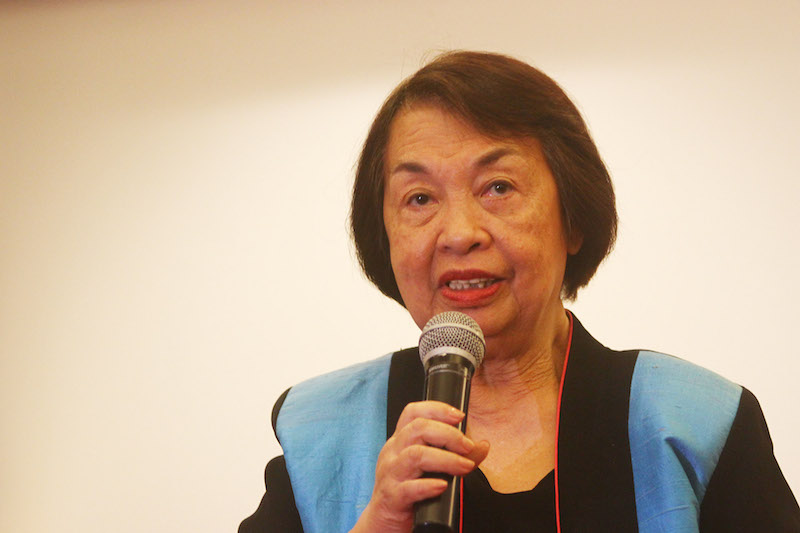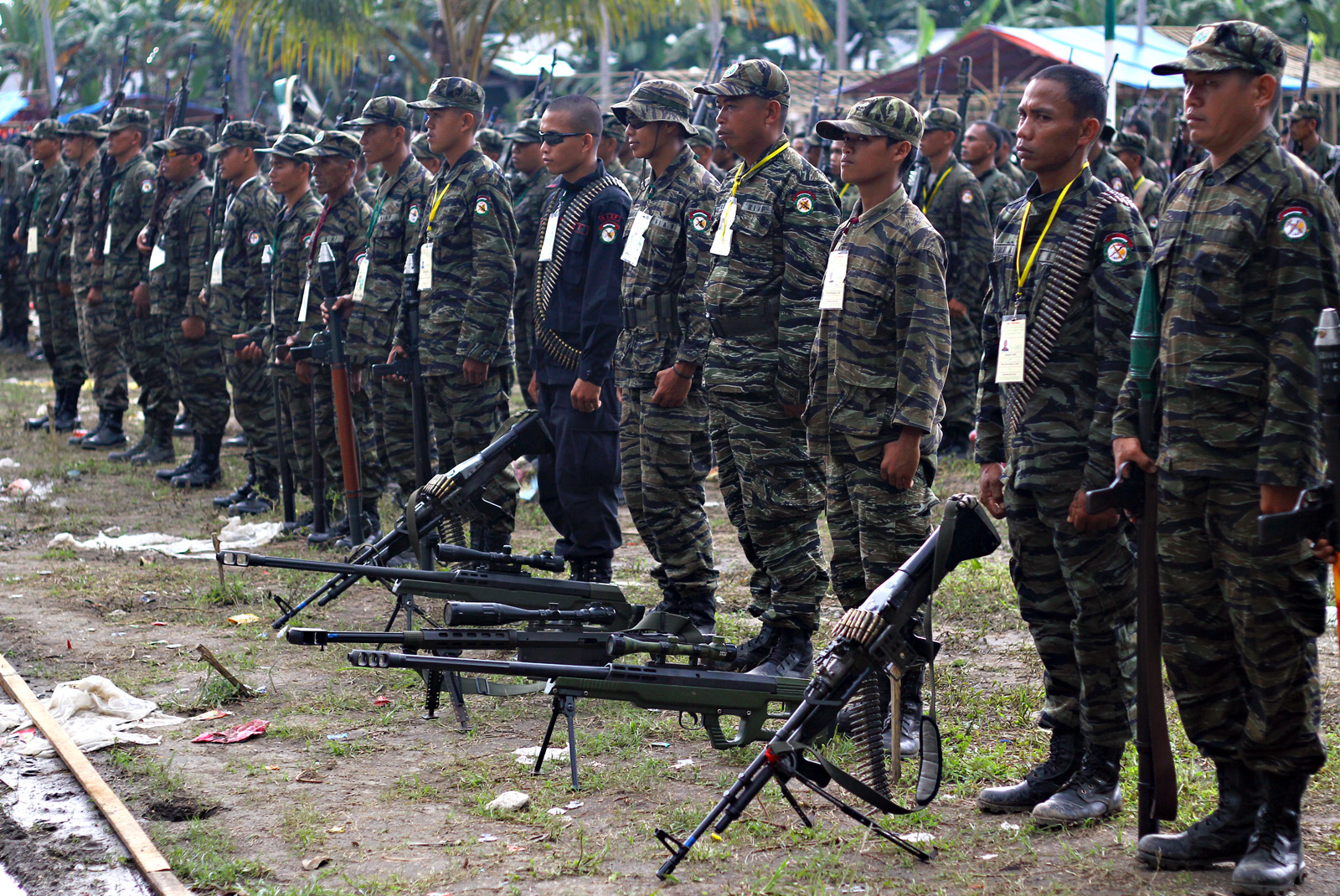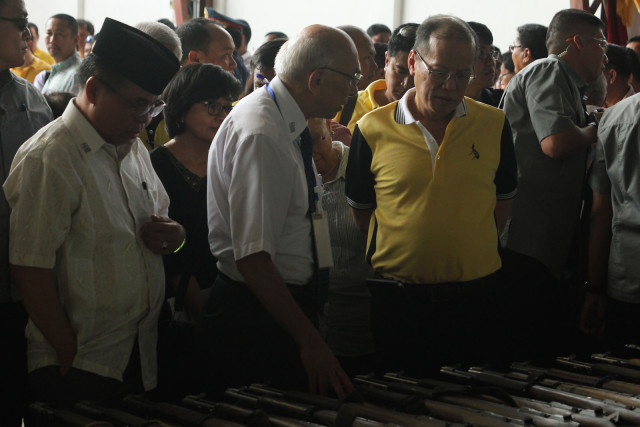DAVAO CITY (MindaNews/22 July) — It will be difficult to convince the Moro Islamic Liberation Front (MILF) to decommission their weapons if government fails to disband first the private armies in the Autonomous Region in Muslim Mindanao (ARMM), an official said in a gathering here Friday of mostly Moro non-government organizations.
Irene Santiago, chair of the government’s Peace Implementing Panel in peace process with the MILF, said such scenario would make MILF members insecure and reluctant to turn over their firearms as requisite for normalization.
 Government implementing panel chair Irene Santiago speaks in a press conference in Davao City commemorating the third anniversary of the signing of the Comprehensive Agreement on the Bangsamoro on Wednesday, March 29, 2017. MINDANEWS PHOTO
Government implementing panel chair Irene Santiago speaks in a press conference in Davao City commemorating the third anniversary of the signing of the Comprehensive Agreement on the Bangsamoro on Wednesday, March 29, 2017. MINDANEWS PHOTO
“That’s why we told the PNP (Philippine National Police) to do it (disbandment of private armies) while martial law is still in effect,” she said in Filipino.
Decommissioned firearms will be turned over to the Independent Decommissioning Body led by Turkey.
Santiago said there are 75 private armies across the country of which 72 are in the ARMM.
Asked to comment on the possibility that disbanding the private armies of politicians would lead to trouble, Santiago said problems will arise if government plays favorites.
“What if we start with the biggest one? Until now, that’s where our discussion is. It needs political will. If the government plays favorites, diyan magkaproblema” (that will be a problem), Santiago said.
Santiago explained that the incumbent President is not afraid to do what previous Presidents didn’t. “If there’s anybody who can do it, it’s this President,” she said.
For decommissioned MILF guerrillas, Santiago said the assistance should respond to their actual needs. “Baka bibigyan natin ng kalabaw pero wala namang lupa (We might give them carabaos even if they have no lands to till).”
 Members of the Bangsamoro Islamic Armed Forces (BIAF) of the Moro Islamic Liberation Front (MILF) stand at attention at the end of the four-day Bangsamoro Leaders Assembly inside Camp Darapanan, Sultan Kudarat, Maguindanao on 9 July 2012. MindaNews file photo by Erwin Mascarinas
Members of the Bangsamoro Islamic Armed Forces (BIAF) of the Moro Islamic Liberation Front (MILF) stand at attention at the end of the four-day Bangsamoro Leaders Assembly inside Camp Darapanan, Sultan Kudarat, Maguindanao on 9 July 2012. MindaNews file photo by Erwin Mascarinas
She proposed instead that socioeconomic assistance for decommissioned combatants and communities prioritize the provision of basic services.
She added that the decommissioning process depends on the progress of the deliberations on the Bangsamoro Basic Law (BBL) in Congress.
The Comprehensive Agreement on the Bangsamoro (CAB) signed in 2014 by the government and the MILF provides for the decommissioning of MILF fighters and weapons as part of the normalization arrangement which seeks to restore normalcy in communities affected by the decades-long armed conflict in Mindanao.
 Moro Islamic Liberation Front chair Al Haj Murad Ebrahim and (then) President Benigno Aquino III inspect the firearms during a ceremonial turnover at the old Maguindanao provincial capitol in Sultan Kudarat on June 16, 2015. The MILF turned over a total of 75 weapons as an initial step toward decommissioning. MindaNews fiel photo by TOTO LOZANO
Moro Islamic Liberation Front chair Al Haj Murad Ebrahim and (then) President Benigno Aquino III inspect the firearms during a ceremonial turnover at the old Maguindanao provincial capitol in Sultan Kudarat on June 16, 2015. The MILF turned over a total of 75 weapons as an initial step toward decommissioning. MindaNews fiel photo by TOTO LOZANO
But the CAB provides for a gradual decommissioning process and in sync with identified milestones in the legislative timetable of the BBL.
The next phase of decommissioning will involve 30% of the MILF’s combatants and weapons and will occur after the passage of the BBL and before its ratification through a plebiscite.
In June 2015, 55 high-powered and 20 crew-served weapons were turned over by the MILF to the IDB in the presence of then President Benigno Simeon Aquino III. Also decommissioned were 145 members of the Bangsamoro Islamic Armed Forces (BIAF), the MILF’s armed wing.
The ceremonial turnover was the first of four phases agreed upon by the Philippine government (GPH) and the MILF under the Annex on Normalization signed on January 25, 2014.
The first phase involves only a small number of weapons and forces decommissioned — “bonus” as MILF peace panel chair Mohagher Iqbal told reporters before the program started — but the second phase, which ends with the ratification of the BBL, involves the decommissioning of thousands of weapons and combatants.
The Annex provides that when the BBL is ratified, 30% of the forces and weapons would be decommissioned, 35% more in the third phase and the last 35% in the fourth phase.
The MILF’s BIAF has an estimated 10,000-strong armed force.
The administration targets to have the BBL passed by Congress by December 2017 and to submit it to a plebiscite in May 2018.
Santiago described the BBL draft submitted to President Duterte on Monday as “a better version”.
“We finished it in record time, three months and 10 days,” she said.
But Santiago admitted that working for the passage of the BBL “is not easy and complex”.
Santiago said she is “afraid, in fact, very afraid, as you probably are” that pag di napasa ang BBL, giyera (if the BBL is not passed, there will be war) especially since there is still this problem with the Maute Group and its allies whom government forces are fighting in Marawi.
If the BBL does not pass, Santiago said, the Bangsamoro Islamic Freedom Fighters (BIFF) which broke away from the MILF following the aborted signing of the Memorandum of Agreement on Ancestral Domain in 2008, will likely say “So anong napala ninyo, negotiate kayo nang negotiate” (So what did you gain? You just negotiate and negotiate).
Santiago’s apprehensions that the failure to pass the BBL will make “violent extremism” more attractive to the Moro people is shared by many in Moro civil society. (H. Marcos C. Mordeno / MindaNews)
